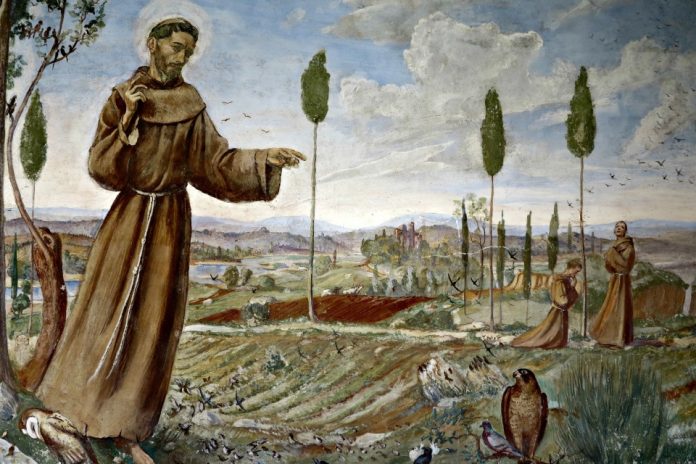Love for the Family of Creation
In the early days of his conversion and his wanderings as a hermit, St. Francis may have pondered day after day about God’s abundant providence as he marveled at the beauty of the Umbrian countryside. He may have reflected on the inescapable reality that all creatures and all of inanimate creation share special familial bonds, as the handiwork of, and continually sustained by, one and the same Creator. He may have also reflected that all of creation must be good, since God is perfect goodness. If one resolves to love God, then one also resolves to love all that he has created, even those creatures that have turned to evil, provided one endeavors to lead them back to God.
This special kinship which inspires all Franciscans to call God’s creations as “brothers” or “sisters” is a revolutionary theological statement that is uniquely St. Francis’. Loving God through his creation has endeared St. Francis for generations of admirers, both Christian and non-Christian. St. Francis is the undisputed patron of the ecological movement. Franciscans are called therefore to be the vanguard and custodian of this great heritage of environmental care.
Joy
Franciscan joy is different from joy as the world knows it. Based on the biographers of St. Francis, the Seraphic Father taught his disciples that perfect joy is the soul’s contentment in the grace of God alone. For Franciscans, only God is needed, only God can make one truly happy. Happiness does not lie in one’s experiences in the world, whether they are successful or humiliating, lucky or unfortunate, victorious or tragic. Happiness is in God alone and every life experience must be pondered upon as a lesson that leads to him. Just as our Lord received tears, curses and insults, we also receive the same for the love of him, leading us all to Christ’s cross and herein lies perfect joy. It seems foolish that misfortune or mockery should still evoke smiles in one’s face, but this is one of the most amusing contradictions that make Franciscans among the most light-hearted religious in the Church.
Peace
For Franciscans, peace is paramount. If Franciscans are more than willing to express love for all creation, for all humanity, or for all nations, then it follows that Franciscans are more than willing to act to prevent discord between people, communities, or countries. St. Francis understood that God created all humanity in his goodness – the imago Dei – regardless of class, creed, ideology or religion into which one is born. He also understood that there is no principle or personal interest too great that two persons could not live in harmony. Though conflict is inevitable, there is always room for dialogue to discover common grounds where cooperation is possible and benefits are mutually obtained. For conflicts that have turned damaging, militant Franciscans will still continue to seek these common grounds to end the violence and will prepare to help in the healing of emotional wounds incurred from such violence. The legacy of St. Francis in the search for world peace is so strong that Franciscans are known to have initiated movements that brought together people from different faiths and cultures.
Fraternity
The uniqueness of a Franciscan’s love and mission to be a “brother and sister to all” leads to St. Francis’ concept of fraternity. Generally, Franciscans are spiritual brothers and sisters to humanity that the whole world may be said to be “one big fraternity.” St. Francis was responsible for developing the model of a close-knit family/community of Franciscans in which the practice of the perfection of charity starts and will be tried and tested throughout a Franciscan’s life. The preparation a Franciscan achieves in repeatedly bearing the human faults and individual differences of fellow Franciscans, as they struggle to live together in the ordinary circumstances of life, helps one to understand and be deepened in the teachings of the Gospel and to apply such experiences in their relationships with the rest of the Church and the world.
Prayer
The goal of Franciscan prayer is to bring Christ to birth in our lives through the action of the Holy Spirit. Franciscan prayer is therefore an invocation to the Holy Spirit to guide us to contemplation that is centered on Christ and is incarnational. There is less breadth in spiritual reading or in social action, but more depth in trying to find Christ in one’s heart and in our daily interactions with other people. We try to find Christ in our everyday experiences and in turn, we become like him. We preach about Christ therefore by using less words and by becoming more like him for others, especially those who are in need of him, or have been left behind.
Brother Jess Matias is a professed brother of the Secular Franciscan Order. He serves as minister of the St. Pio of Pietrelcina Fraternity at St. Francis of Assisi Parish in Mandaluyong City, coordinator of the Padre Pio Prayer Groups of the Capuchins in the Philippines and prison counselor and catechist for the Bureau of Jail Management and Penology.
The views expressed in this article are the opinions of the author and do not necessarily reflect the editorial stance of LiCAS.news.









